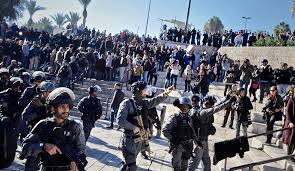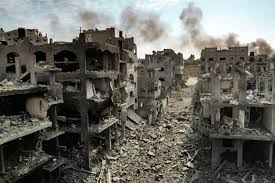 Introduction:
Introduction:
In recent years, the conflict between Israel and Hamas has gained significant international attention. Amidst the tragic loss of lives and the deep-rooted political complexities, a closer examination reveals that there are often hidden economic and geopolitical interests that underpin this ongoing conflict. Delving into the multifaceted nature of these forces, this article sets out to explore the profits behind Israel's war with Hamas.
A Divisive Conflict:
The Israel-Hamas conflict is undoubtedly one of the most contentious and protracted conflicts in modern history. It is rooted in a complex web of religious, political, territorial, and historical factors. However, beneath these layers lie vested economic interests that catalyze the ongoing strife, making it even more challenging to find a lasting solution.

The Military-Industrial Complex:
One critical aspect to consider is the military-industrial complex. Israel is renowned for being one of the world's leading manufacturers of advanced military technology, including drones, weaponry, and surveillance systems. Thus, the continuation of the conflict provides a testing ground for Israeli defense industries to showcase their products, attracting international clients seeking effective defense solutions.
In addition to promoting technological prowess, the conflict with Hamas enhances Israel's bargaining power in the global arms trade, making it an attractive partner for countries seeking to strengthen their own military capabilities. Consequently, Israeli defense companies profit handsomely from this perpetual conflict, bolstering the country's economy and job market.

Geopolitical Interests:
Beyond economic considerations, geopolitics play a significant role in the Israel-Hamas conflict. Israel sits at the crossroads of several regional alliances and rivalries. The conflict serves as a testing ground for Israel's military might, enhancing its position as a crucial ally for various global powers involved in the Middle East, such as the United States.
Additionally, Israel's strategic geographic location grants it access to crucial trade routes and natural resources, making it a valuable partner for nations seeking to secure their interests in the region. As a result, some argue that the Israeli government may view the conflict with Hamas as a means to strengthen its geopolitical relevance and secure support from influential allies.

The Arms Trade:
The Israel-Hamas conflict acts as a catalyst for the global arms trade, benefiting arms dealers and manufacturers worldwide. International defense companies keenly observe this conflict to understand emerging market trends, defense needs, and the effectiveness of their products in real-world combat situations. The perpetuation of violence ensures a consistent demand for arms, driving profits for defense companies in countries that support either side of the conflict.
In addition, weapons manufacturers and suppliers often find themselves entangled in a destructive cycle, as arms provided to one side may eventually find their way into the hands of adversaries. This dynamic fuels a constant need for new weapons and further drives up arms trade revenues.

The Economics of Aid:
Lastly, international aid plays a significant role in the Israel-Hamas conflict. As the conflict escalates, humanitarian needs increase, leading to a rise in international aid funding. This aid often translates into economic benefits for certain sectors of the Israeli and Palestinian economies. For example, construction companies benefit immensely from rebuilding efforts after each violent episode, increasing economic activity and driving profits.
Conclusion:
The conflict between Israel and Hamas goes far beyond the headlines, as economic and geopolitical interests intertwine with complex historical and religious factors. Understanding the profits behind this conflict offers insights into the obstacles that obstruct a peaceful resolution. As the world continues to grapple with the consequences of this enduring strife, it is essential to unravel and address the hidden financial incentives that fuel the Israel-Hamas war. Only then can meaningful progress be achieved towards a lasting and just peace for both Israelis and Palestinians.


You must be logged in to post a comment.